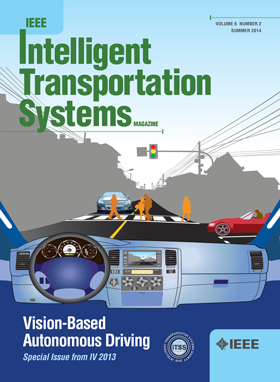基于博弈论的公交自动变道协调决策
IF 7.9
1区 工程技术
Q1 ENGINEERING, CIVIL
IEEE Transactions on Intelligent Transportation Systems
Pub Date : 2025-02-04
DOI:10.1109/TITS.2025.3533577
引用次数: 0
摘要
由自动驾驶公交车(ABs)和人类驾驶汽车(HDVs)组成的混合交通正变得越来越普遍,但由于自动驾驶汽车与异构HDVs之间复杂的相互作用,其变道决策仍然具有挑战性。为了解决上述挑战,本文提出了一种基于博弈论的和谐决策(GTHD)算法,该算法考虑了hdv驾驶风格的细微差别,在与hdv的交互中实现了类似人类的性能。从技术上讲,GTHD的博弈论模型使用对敌方车辆运动的预测和预先规划的轨迹信息。此外,利用历史数据聚类得到驾驶风格的先验估计,并通过贝叶斯估计实时细化。然后,利用驾驶风格估计对博弈论模型进行修正。修正后的模型更接近对手的偏好,同时调整自我偏好以适应对手。GTHD的有效性通过硬件和人在环模拟器以及MLC场景中的数据集进行验证。结果表明,在不同工况下,GTHD与人类公交车司机的变道准确率达到91.50% ~ 98.50%,优于几种基于数据驱动的变道模型。代码是开源的,可以在https://github.com/guofan999/GTHD上获得。本文章由计算机程序翻译,如有差异,请以英文原文为准。
Game Theory-Based Harmonious Decision-Making for Autonomous Bus Lane Change
Blended traffic, comprising autonomous buses (ABs) and human-driven vehicles (HDVs), is becoming increasingly common, yet the lane change decision-making for ABs remains challenging due to complex interactions with heterogeneous HDVs. To address the challenge above, this paper proposes a game theory-based harmonious decision-making (GTHD) algorithm considering nuance of driving styles of HDVs, achieving human-like performance in interactions with HDVs. Technically, a game theoretic model of the GTHD uses predictions of the opposing vehicle’s motion and the information from preplanned trajectories. Besides, a prior estimation for driving styles is obtained utilizing clustering of historical data, and refined in real time through Bayesian estimation. Then, the driving style estimation is utilized to modify the game theoretic model. The modified model provides a closer depiction of the opponent’s preferences, meanwhile adjusts self-preferences to adapt to the opponent. The efficacy of GTHD is validated using a hardware and human in loop simulator and datasets in MLC scenarios. It is shown that the GTHD achieves human-like performance with 91.50%-98.50% accuracy compared with human bus driver under different conditions, better than several lane change models based on data driven methods. The code is open source and available at https://github.com/guofan999/GTHD .
求助全文
通过发布文献求助,成功后即可免费获取论文全文。
去求助
来源期刊

IEEE Transactions on Intelligent Transportation Systems
工程技术-工程:电子与电气
CiteScore
14.80
自引率
12.90%
发文量
1872
审稿时长
7.5 months
期刊介绍:
The theoretical, experimental and operational aspects of electrical and electronics engineering and information technologies as applied to Intelligent Transportation Systems (ITS). Intelligent Transportation Systems are defined as those systems utilizing synergistic technologies and systems engineering concepts to develop and improve transportation systems of all kinds. The scope of this interdisciplinary activity includes the promotion, consolidation and coordination of ITS technical activities among IEEE entities, and providing a focus for cooperative activities, both internally and externally.
 求助内容:
求助内容: 应助结果提醒方式:
应助结果提醒方式:


